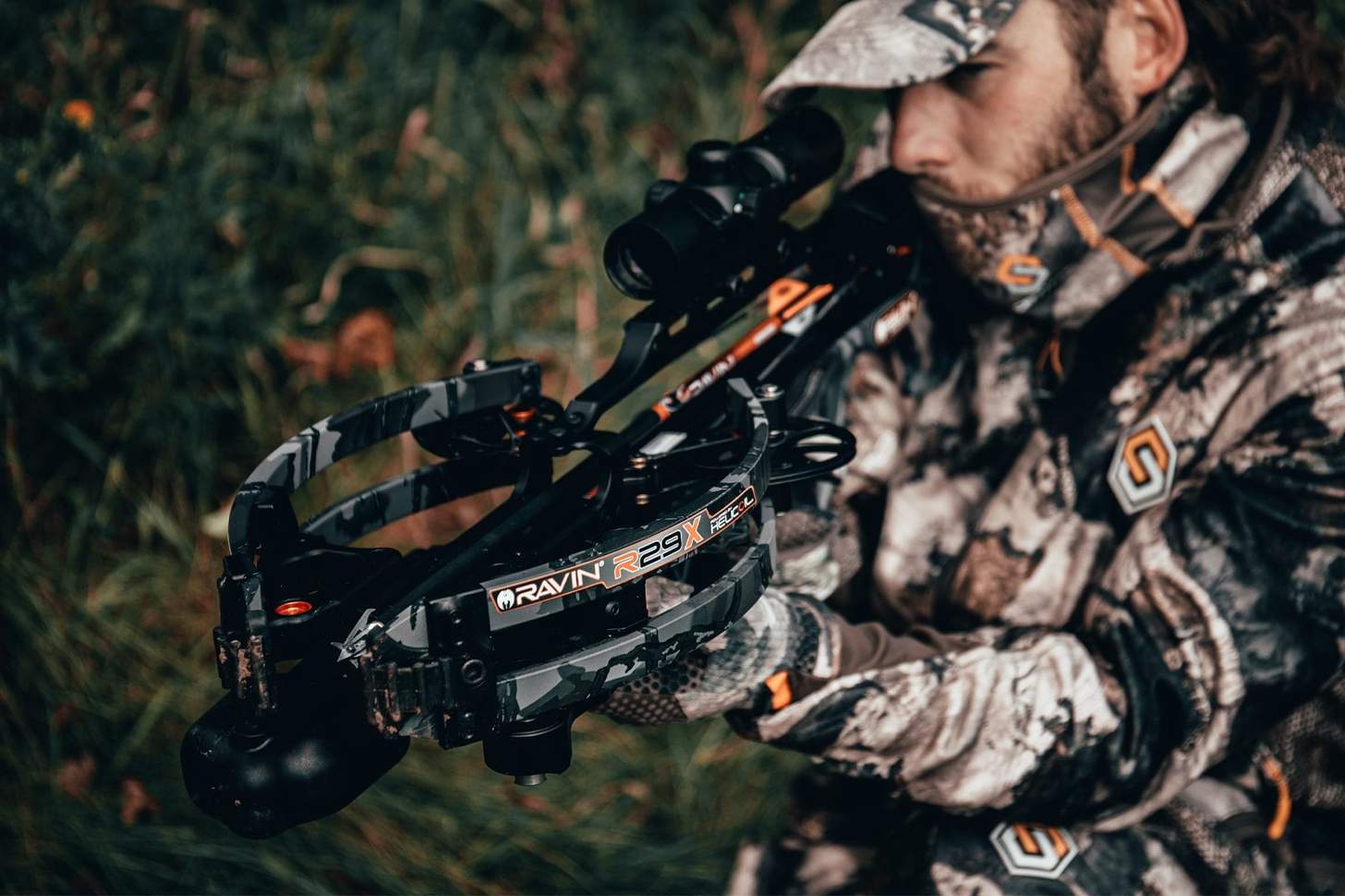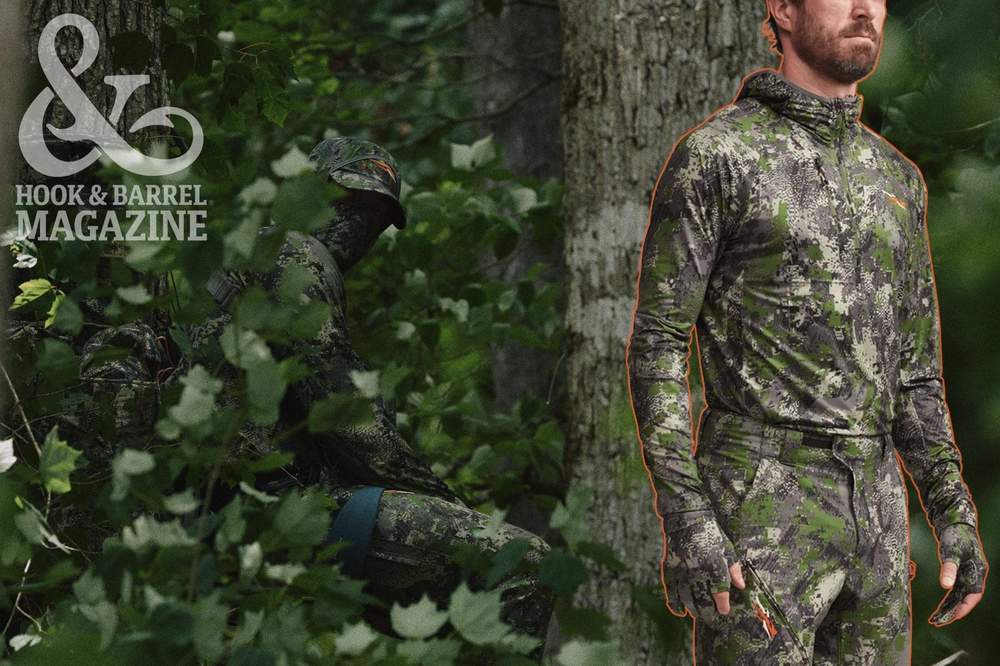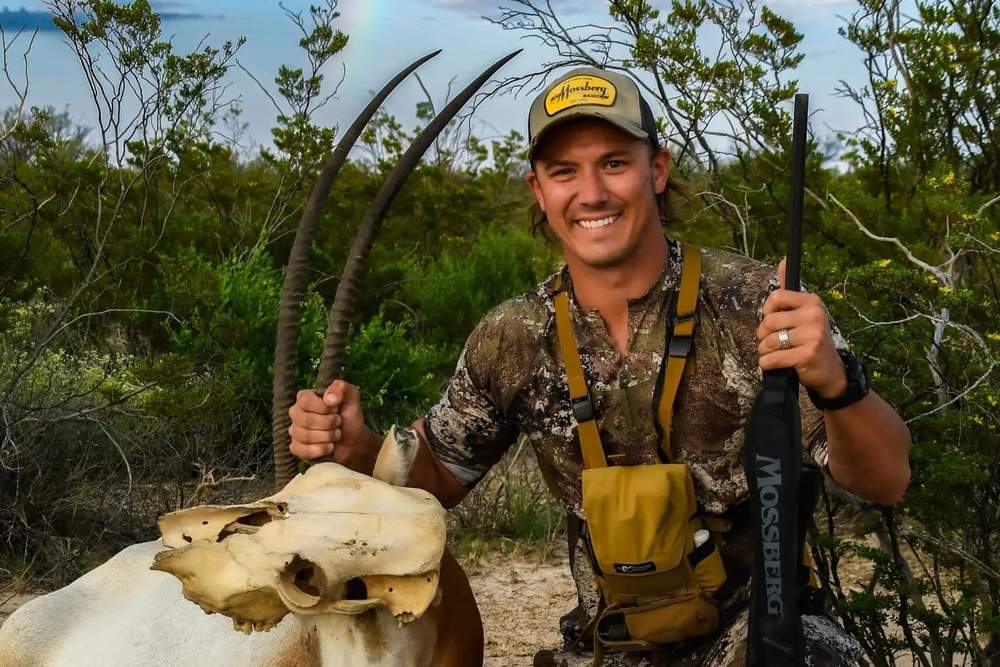(This content is sponsored by Ravin)
A trigger pull, a slight “twang,” and a crossbow bolt rockets downrange at 450 fps. The broadhead blows through the vitals, and the deer falls within seconds. Buck down. Tag filled. Dream fulfilled.
That’s the beauty of a crossbow and one of many reasons hunters use these tools so much. Crossbow hunting is beloved by millions, and the reasons are numerous. But it begs several questions like the following:
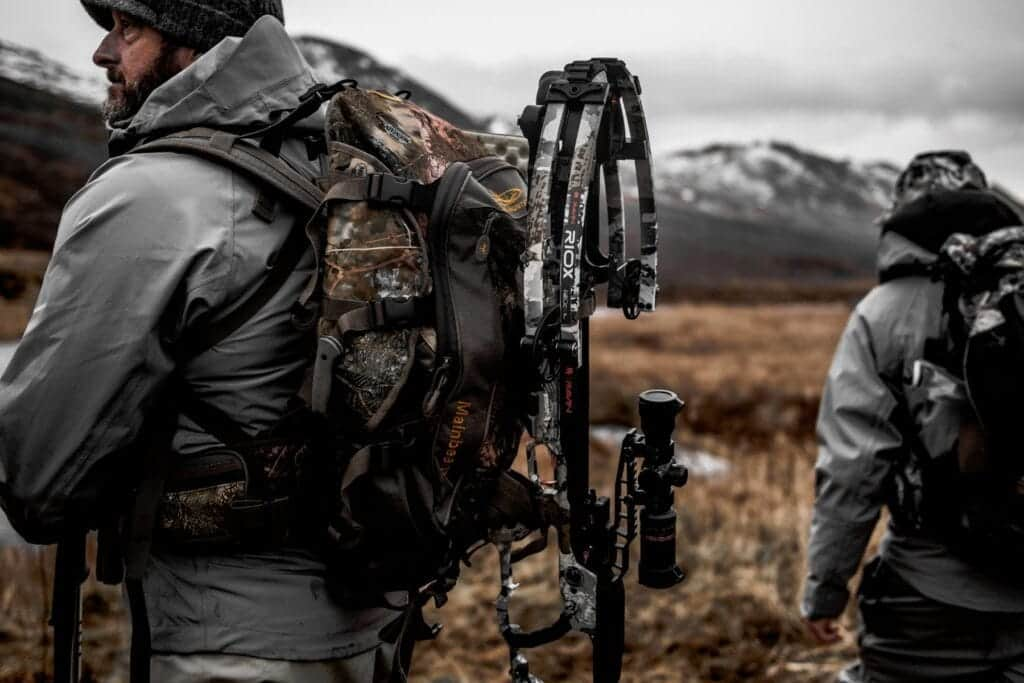
Why are crossbows great for deer hunting? Who should deer hunt with a crossbow? What states are most crossbow-friendly? What is the right crossbow for me? We answer these and more below.
Crossbow Deer Hunting
Crossbows are excellent tools for deer hunting. Just ask the army of hunters who carry these afield each season. Without question, the mighty horizontal bow is taking the archery world by storm.
There are numerous reasons why hunters should carry these speedy bows. The following are reasons why crossbow hunters are typically happy with carrying crossbows while pursuing whitetails.
Upping The Challenge: Those accustomed to deer hunting with rifles, slug guns, and muzzleloaders might look toward greater challenges. One such example is crossbow hunting. It’s more difficult than hunting with a firearm, and thus, can provide a new opportunity for those who are ready to graduate from boom stick to stick and string.
Better Accuracy: Crossbows are well known for their incredible accuracy. With a quality crossbow, it’s easier to be more accurate with these than vertical bows. Everyone wants to shoot better, whether at short-, medium- or long-range distances.
Extended Ranges: Better accuracy is especially more achievable at greater yardages that stretch the capacities of typical compound bow ranges. A high-end crossbow can make shots possible at 60, 80, or even 100 yards. That can make the difference in shooting well on the range or when hunting big game in the field.
Higher FPS Ratings: A faster crossbow translates to a faster fps arrow speed. This means the bolt and broadhead reach the animal faster. This helps in several ways. First, faster speeds mean less arc, which leaves less room for shot location errors (elevation-wise). Second, faster speeds produce less chance of wind affecting the shot. Third, however slight an impact, higher crossbow speeds produce slightly lower odds of a deer jumping the string enough to place the shot outside of the kill zone.
Extending Seasons: Generally, crossbow seasons are significantly longer than firearm seasons. It’s a great way for hunters to extend their seasons through fall and winter. This makes it easier to remain in the field longer for those chasing older bucks. It also gives hunters more days to fill their deer tags and enjoy the great outdoors.
Of course, other reasons abound. But each hunter will determine their reasons for using a crossbow, or not. Focus on needs, and if a crossbow checks the right boxes, maybe it’s time to get one.
Why Crossbows Are For Everyone
Crossbows are excellent tools for virtually any hunter. That said, some hunters might benefit from these more than others. If you’re among the following groups, even better. If not, these are still great weapons to use and hunt with.
Youth Hunters: The crossbow can be one of the best tools for getting youth involved in hunting. The learning curve is much shorter than with a compound. Furthermore, there are fewer challenges to overcome and fewer things to go wrong, once hunting. Therefore, the crossbow is great for getting youth involved with the outdoors.
Older Hunters: As time goes on, many older hunters lose the strength to draw back or hunt with compound bows. A good crossbow can keep them in the field. Choosing to hunt with a crossbow might be the difference between additional seasons of deer hunting or hanging it up for good.
Treestand Hunters: Those who hunt from treestands must move less than those who hunt from box and hub-style hunting blinds. A compound bowhunter can draw back in a blind with lower odds of spooking deer. But those in treestands are sometimes in plain view, and getting drawn back is more challenging. With a crossbow, you’re already “drawn back” and ready to pull the trigger.
Still Hunters: A still hunter is someone who slowly eases through cover. Rather than being stationary, they ever-so-slowly pick their way across the landscape. Of course, far more time is spent standing or sitting still than moving, but hunters move, nonetheless. Generally, this tactic is reserved for gun hunters. That said, those packing a crossbow make it a more viable approach for archery.
Ground Hunters: Some deer hunters choose to sit on the ground and hunt without a hunting blind. Doing this with a compound bow is quite challenging. Being eye level without cover can make it nearly impossible to get drawn back and a shot off on whitetails. That said, crossbow hunters can use this method with a greater degree of success. Once again, they don’t have to get “drawn back” like a compound bowhunter.
Hunters Wanting an Extra Edge: Let’s be honest, a crossbow provides a bigger advantage over a compound bow, just as a vertical bow offers significant advantages over traditional archery equipment. Of course, it’s not something to be ashamed of. (Gun hunters have even more advantages, and we don’t shame them.) That said, hunters who want this extra edge provided by crossbows should use these without feeling remorse.
Injured and Handicapped Hunters: Anyone who can’t pull back a compound bow, or who do so with pain or discomfort, might choose a crossbow. In some states, even if outside of general crossbow season, injured and handicapped hunters may use crossbows (with the right permit). Check your state regulations.
Those Bridging Gun Hunting and Archery: Gun hunters who’ve never hunted with a bow tend to feel intimidated by vertical bows. In that case, consider bridging the gap by hunting with a crossbow. This can help hunters dip their toes in the archery world, and eventually, can work their way to using vertical archery gear.
Top Crossbow-Friendly States
There are numerous destinations that make crossbow hunting possible. In fact, most states offer at least a short window of crossbow hunting for big game. That said, some are even more accepting of these hunting weapons.
For example, only one state labels crossbow use as an illegal hunting method. All others allow it for at least a portion of the deer season. The following states are most notably friendly to crossbow hunters.
Northeast: Connecticut, Delaware, Maryland, New Jersey, Pennsylvania, Rhode Island, Vermont and West Virginia
Southeast: Alabama, Georgia, Louisiana, Mississippi, North Carolina, South Carolina, Tennessee, Texas and Virginia
Midwest: Arkansas, Illinois, Indiana, Kansas, Kentucky, Louisiana, Michigan, Minnesota, Missouri, Nebraska, Ohio and Oklahoma
West: Wyoming (somewhat in Idaho and New Mew Mexico)
Even if your state isn’t mentioned above, chances are good you can hunt with a crossbow for several weeks or months out of the year. Of course, check your state’s hunting regulations and season dates for up-to-date information.
Crossbow Deer Hunting Tips & Tactics
There are many tips and tactics that are specific to crossbow hunting for deer. Here are just a few to remember.
1. Buy crossbow-specific broadheads. Use good ones.
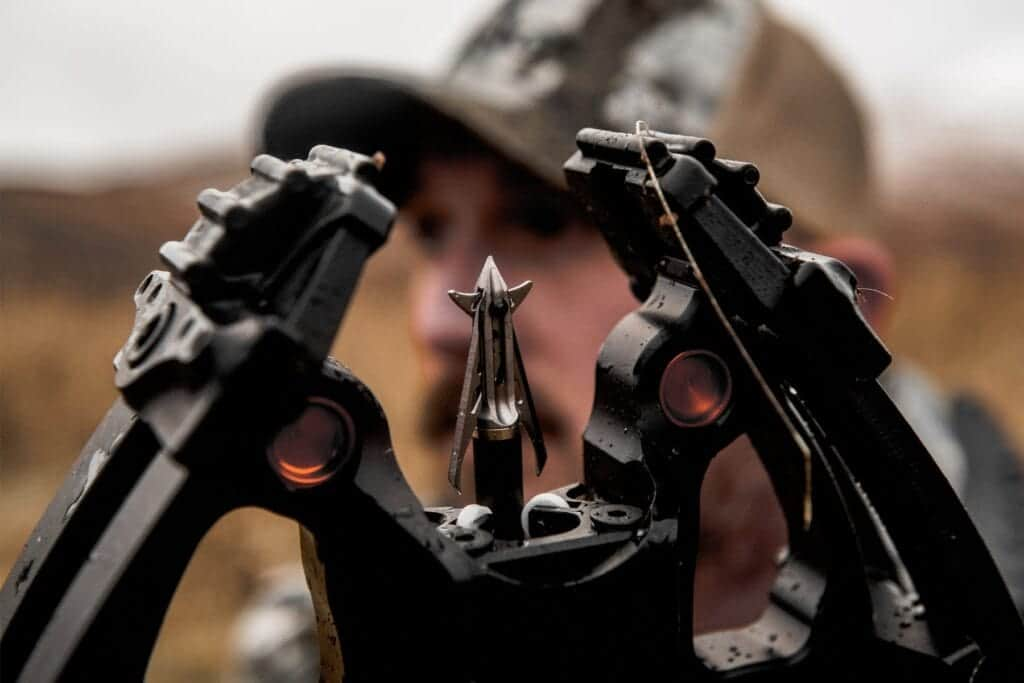
2. Don’t skimp on optics.
3. Chronograph your crossbow (to set the fps exactly right).
4. Use a good set of shooting sticks.
5. Set up your spots for crossbow hunting.
6. Keep your hands down (away from the limbs and strings).
7. Practice aplenty and don’t think a good shot is just given.
8. Forget taking quartering-to shots, as a crossbow is much closer to a compound bow than a rifle.
9. Don’t store a crossbow cocked.
10. Stick to your proven effective range.
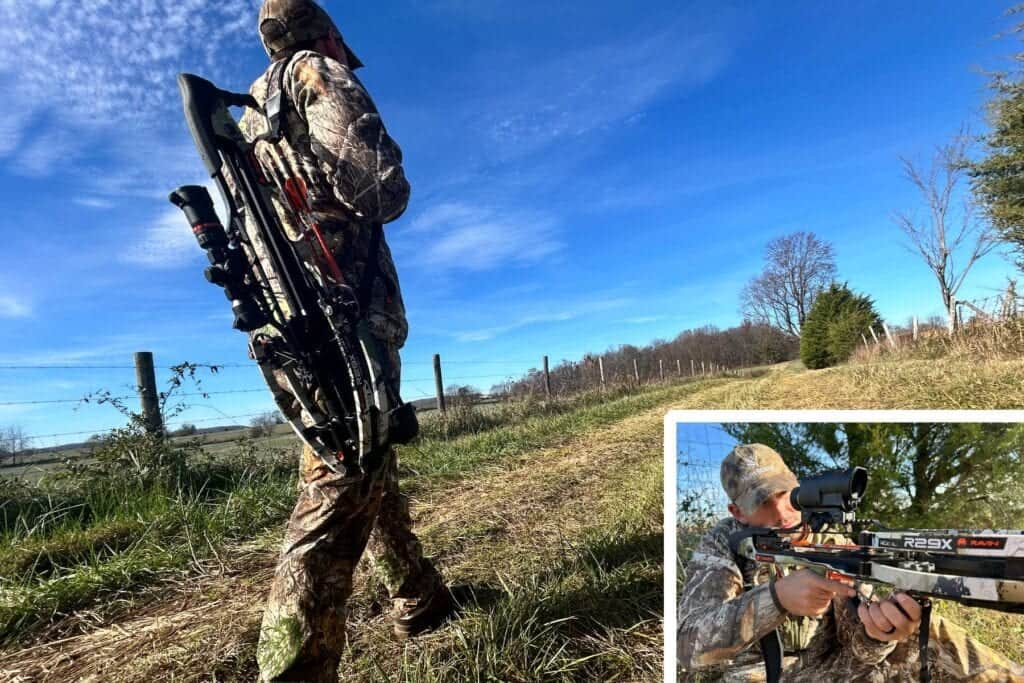
Ravin Crossbows That Rock
Ravin R29X
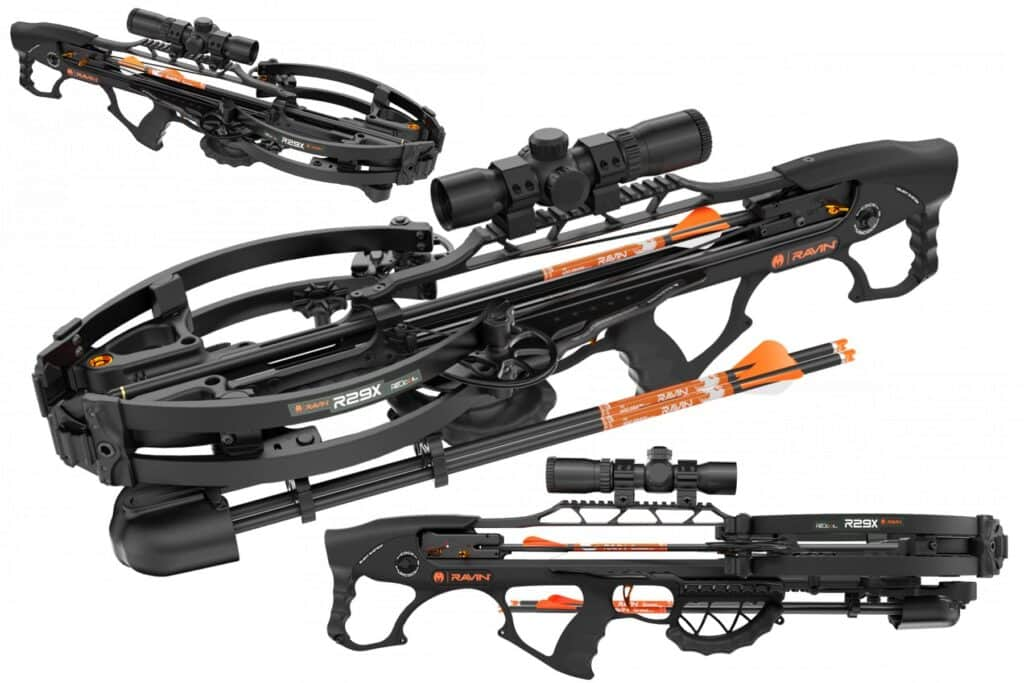
The Ravin R29X comes with the HeliCoil Technology, resulting in 450 fps. It also features a Silent Cocking System. Additionally, it has a 12-pound draw force, and boasts 180 ft-lbs. of energy, measures 29 inches long, and weighs 6.75 pounds. The stock style is ambidextrous, and the stock material is polymer. It comes with a 100-yard illuminated crossbow scope (red and green), which is fog-proof, recoil-proof, shock-proof, and waterproof. The lenses are fully coated. MSRP is $2,349.99.
Ravin R18
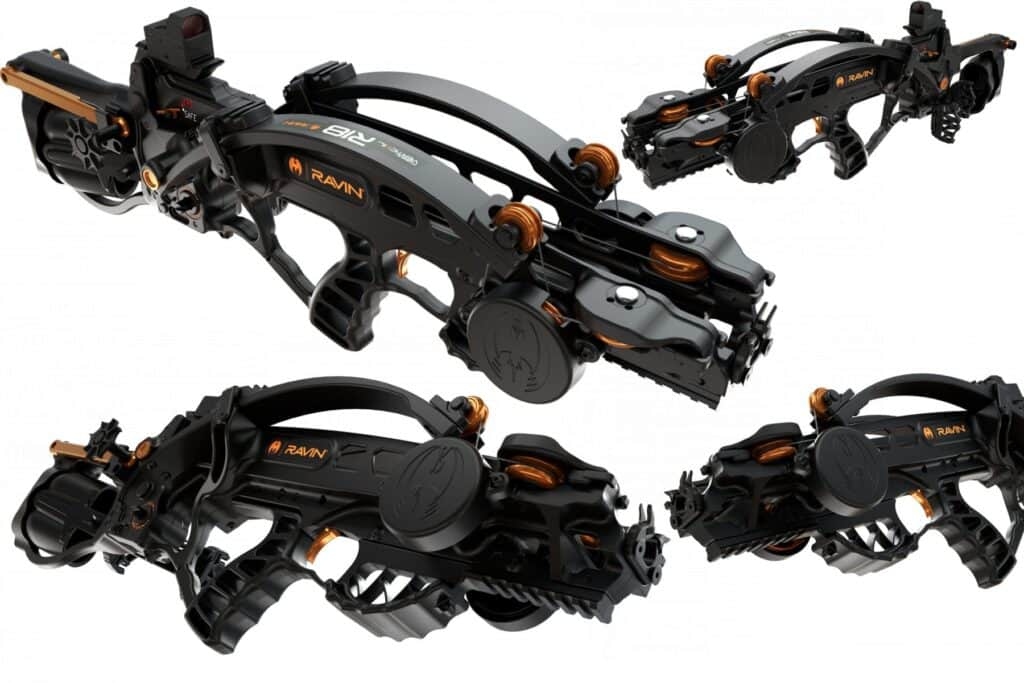
Innovation and out-of-the-box design make the Ravin R18 a true modern hunting marvel. The R18 features takedown-style vertical limbs, a detachable stock with an integrated removable quiver system, the Ravin 3-Dot Reflex Sight and a built-in cocking mechanism for easy drawing.
The Ravin R18 is unique and looks like a hunting tool out of the still-to-come space age. It shoots 330 fps (with a 350-grain setup). It measures 25 inches long (18 inches without the stock). It comes with the VertiCoil Cam System, which rotates small cams 720 degrees (allowing for compactness). Overall, it has a 12-pound draw force, and emits 86 ft-lbs. of energy, and weighs 6 pounds. The limbs are fiberglass, the riser is aluminum CNC, and the stock material is nylon fiber. MSRP is $2,049.99.
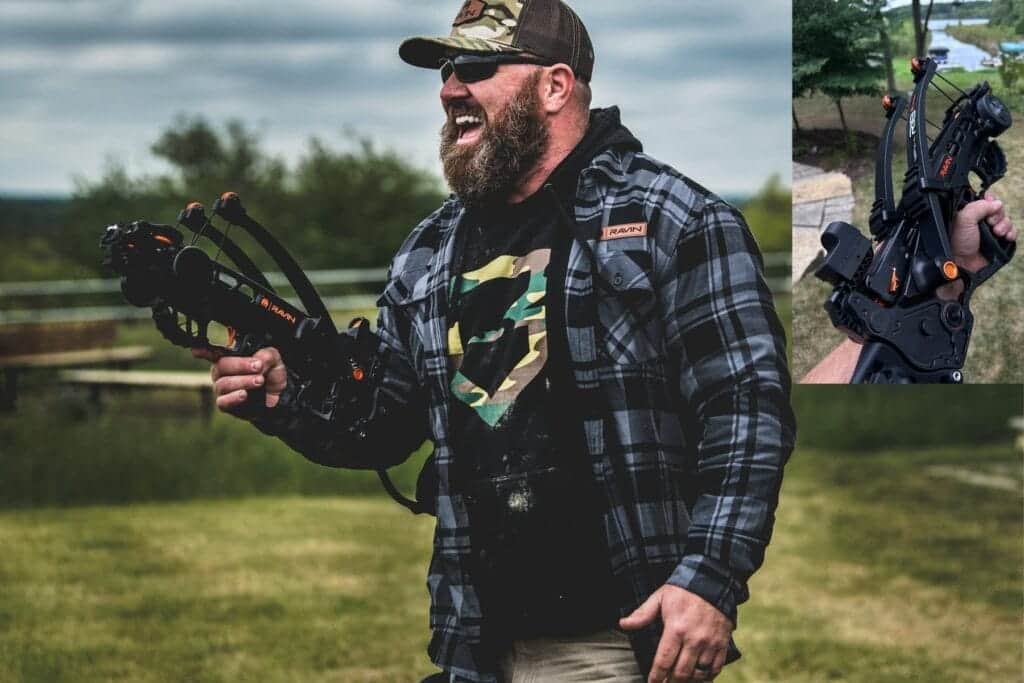
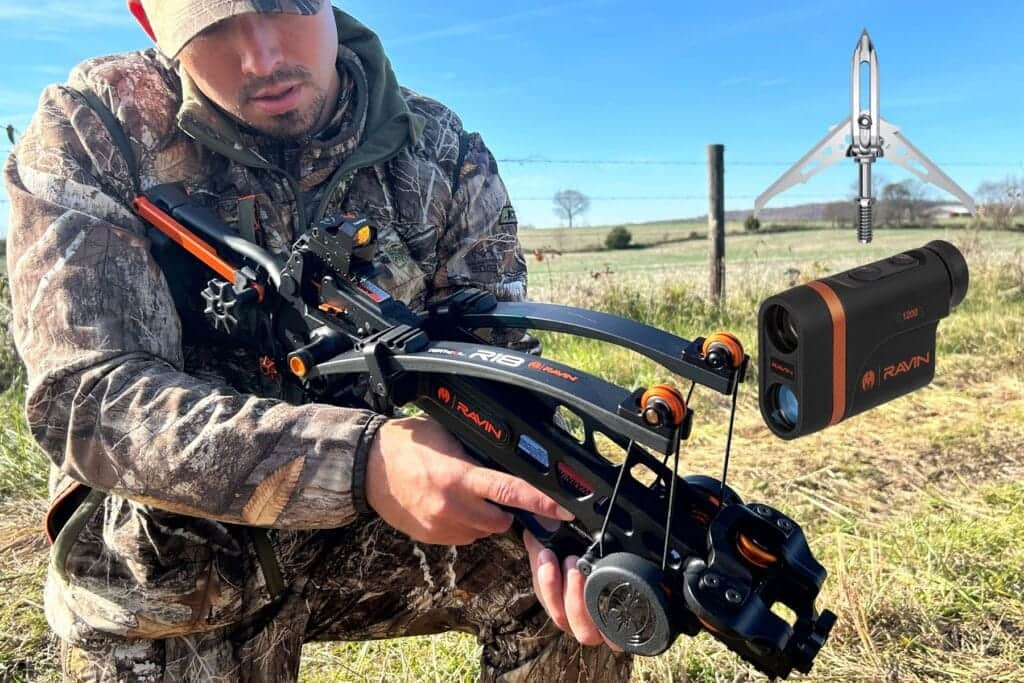
Ravin R10X
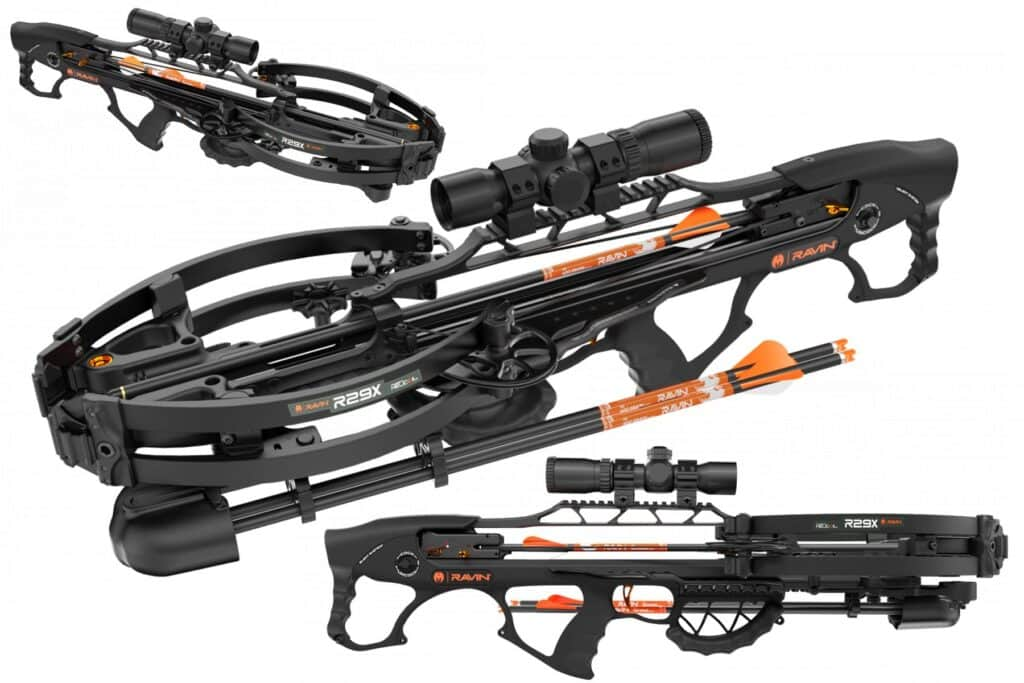
The Ravin R10X is a solid, well-built machine. Shooting 420 fps (with a 400-grain setup), this is Ravin’s best-selling crossbow. It features the HeliCoil technology and is equipped with a newly designed adjustable stock that sports an adjustable cheek pad. It even has silent cocking. Its draw force is 12 pounds, kinetic energy produces 156 ft-lbs. of impact, length is 33 inches, and product weight is 6.8 pounds. The limbs are quad-limb composite, the stock style is ambidextrous, and the stock material is nylon fiber. MSRP is $1,649.99.
So Which Ravin Crossbow Is Right for You?
Those who are in the market for a crossbow must choose the one that is right for them. That involves a lot of things including the following most-relevant factors.
State Hunting Regulations: Hunting regulations can permit whether some crossbows are allowed, or not. For example, states might regulate based on feet per second, length and width of crossbow, etc. Ensure the crossbow selected is compatible with state hunting regulations.
Fit and Feel: Each crossbow offers a different feel. Even different models within the same brand provide differences. It’s important to hold different ones in your hands and see if the fit and feel are right for you.
Style of Hunting: Hunters enjoy and deploy different styles of hunting. And like hunting rifles, different crossbows can be geared more to those different styles. For example, a narrower crossbow is better for confined spaces, such as in blinds or closer to tree trunks. Lighter crossbows are optimal for hunters hiking deeper or higher into the backcountry. Faster, more accurate crossbows are ideal for more open settings.
Anticipated Shot Distances: Those who expect to shoot greater distances might opt for a crossbow that’s proven at longer ranges. A crossbow that peaks out at 50 to 60 yards will not cut the performance mustard at 70, 80, 90, or 100 yards.
Hunt Area Habitat Types: The area you hunt might also impact your crossbow choice. Maybe that food plot is 70 yards across, and you need a crossbow that can cover it. Perhaps it’s a field of native grasses, and you want maximum range. It might even be in the timber, and there’s a good bit of cover, and you need a flatter-shooting crossbow to reduce arc and make it through tight spaces. Whatever the case, hunt area and habitat types certainly influence the best crossbow selection for your hunt.
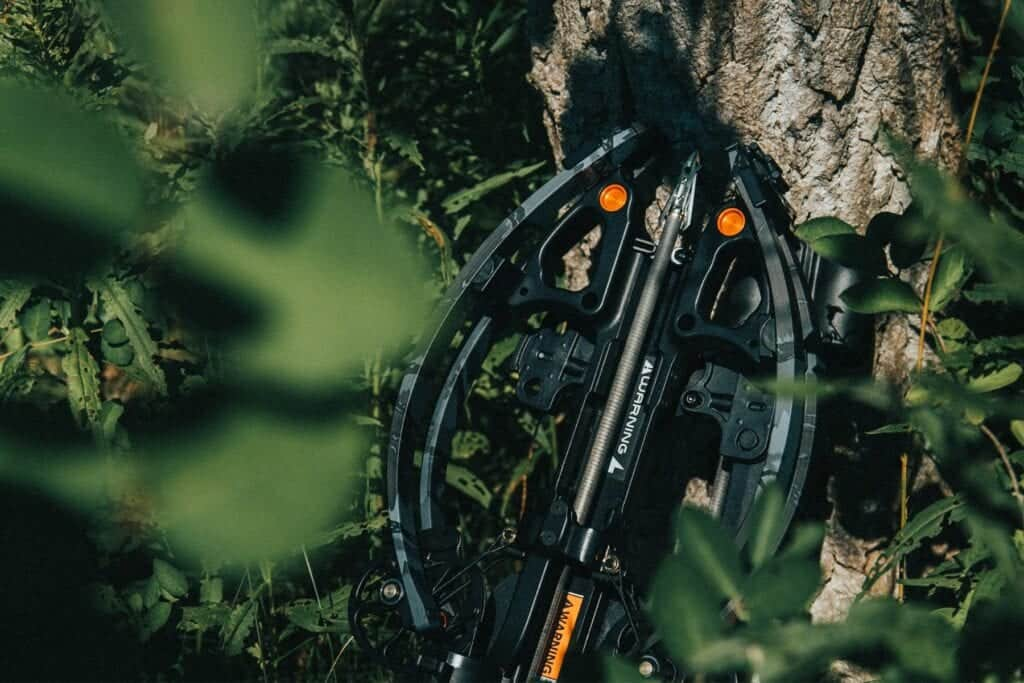
Budgeted Funds: Every crossbow lands at one of several price points. Know your budget, and pick a crossbow that checks all the right boxes, including available funds.
Go Crossbow Hunting For Deer
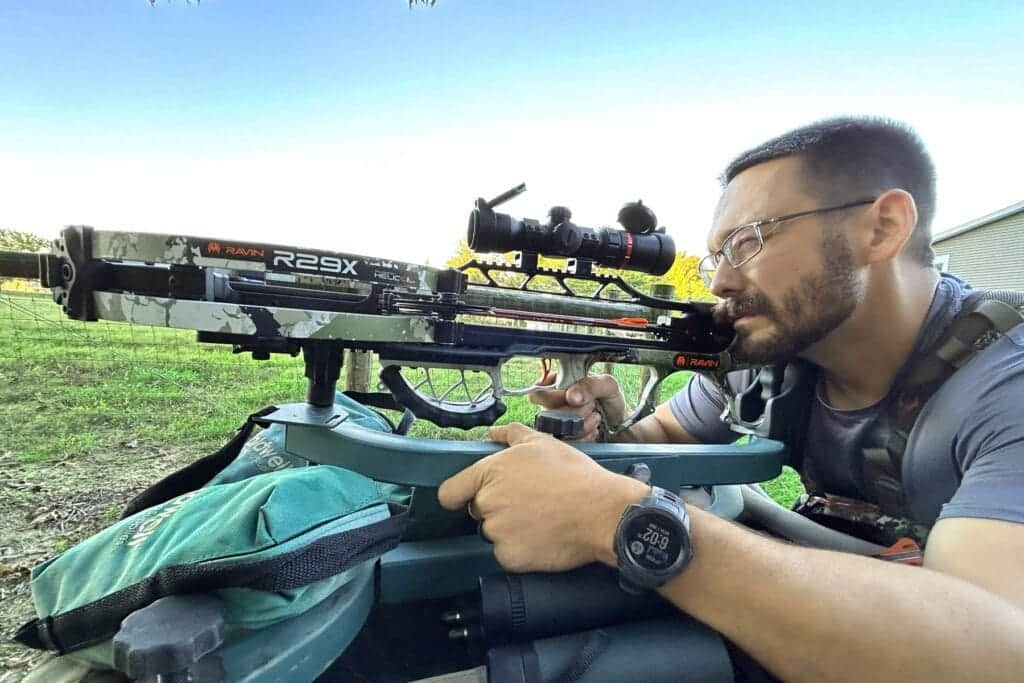
Whatever crossbow you choose, and tactics deployed, enjoy the time afield. Crossbow hunting for deer is fun. It’s a good time to be in the outdoors. This year, make it happen with a Ravin crossbow. To learn more about Ravin's complete and growing line of high-end crossbows and accessories, visit ravincrossbows.com.
